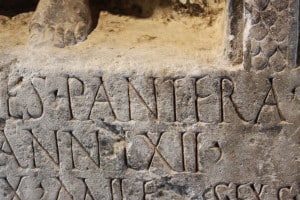There are three basic positions that have been offered in response to the two birth stories we get in Matthew and Luke: 1) Jesus had no human father; 2) Jesus is in fact the biological son of Joseph; 3) Jesus is the biological son of an unnamed male under unknown circumstances.
My own position is that Jesus’ biological father remains unknown but is unlikely Joseph, husband of Mary for the reasons I mention in the previous post. This puts me in an odd position of partial agreement with Christians who take the virgin conception/birth story literally and would likewise hold that Joseph was not the father of Jesus.

But then one faces the sensitive question–if not Joseph then whom? Is there anything at all to be said of this matter? Has any alternative tradition regarding Jesus’ father come down to us? And the answer is yes, the name Pantera is found in a number of ancient sources. Rather than dismiss these out of hand as a “shop-worn tale” produced by Jewish opponents of the Christians who wanted to cast aspersions on Jesus’ paternity, I have tried to honestly examine what one might responsibly conclude about the subject. Having examined the “Jesus son of Panthera” textual traditions in their various forms I then turned to my own investigation of the tombstone of the 1st century Roman soldier, one “Tiberius Julius Abdes Pantera” from Sidon who was buried outside of present day Bingerbrück, Germany. I present the full results of my own study in my book, The Jesus Dynasty. Since that publication I have continued my research on this mysterious name Pantera with quite a bit of new information, as well as replies to various critics of my position, summarized in a series of blog posts, see “Pantera.”
What follows here is a brief summary. The earliest textual evidence on Pantera comes from three sources:
1) We have two stories preserved in supplements to the Mishnah called the Tosefta (as well as in other parallel rabbinic texts but primarily see Tosefta Chullin 2:22-24) that refer to “Yeshu ben Pantera” (with alternate spelling variations). The first involves the famous Rabbi Eliezer ben Hyrcanus who lived in the late 1st and early 2nd century AD. Rabbi Eliezer relates a teaching in the “name of Yeshu ben Pantera” that he heard on the streets of Sepphoris from one Jacob of Kefar Sikhnin. Eliezer himself had been arrested for “heresy” and some have suspected he might have been sympathetic to the Nazarenes. The second story also involves Jacob of Kefar Sikhnin who attempts to heal a certain Rabbi Eleazar ben Dama of a snakebite in the name of “Yeshu ben Pantera.”
Although Maier and a few others have doubted these references are to Jesus of Nazareth, most experts are convinced that they are. Since both of these texts appear to use the designation “Yeshu ben Pantera” in a descriptive rather than a slanderous or polemical way they offer us evidence that Jesus was remembered as “son of Panthera” in the region of Galilee, and even on the streets of Sepphoris, in the early 2nd century. Indeed, Richard Bauckham argues quite persuasively that this Jacob of Kefar Sikhnin might well be James, son (or grandson?) of Jude the brother of Jesus, otherwise known to us as a prominent leader in the Galilean churches (Jude and the Relatives of Jesus, pp. 114-119).
2. The Greek philosopher Celsus relates in polemical work against the Christians preserved by the Christian theologian Origen that he had found it “written” that Jesus was the son of a Roman soldier named Pantera (Contra Celsum 1. 69). This text dates to the late 2nd century. Origen replies that the story was concocted by those who refused to believe that Jesus had no human father and was conceived by the Holy Spirit.
3. The 4th century Christian apologist Epiphanius seems to take the designation “Jesus son of Panthera” seriously in that he argues the name is actually a nickname for Jacob, the father of Joseph, husband of Mary. So rather than denying it is part of the family tradition he tries to explain it within that context.
If one begins to read through the literature on “Jesus son of Panthera” the most common explanation one finds is that “Panthera” is not the real name of any individual at all but a play on the Greek word “Parthenos,” or “virgin” that Jewish opponents of the Christians invented to make fun of their enemies. I am amazed at how many of my critics have referred to this idea as a way of dismissing the Panthera stories as references to a specific individual. This explanation is weak on two counts. First, linguistically, the Greek words panthera and parthenos are not even closely related in sound. But more important, none of the earliest sources quoted above, including Origen and Epiphanius, who both believed in the virgin birth, make use of this explanation. Epiphanius in particular recognizes that this is a “real” name, in the family of Jesus, and his only defense of it being associated with Jesus is to claim it was already “in the family” before Jesus’ birth. In that sense Jesus could rightly be called “Jesus son of Panthera.”
For how could such an old man who had lost his first wife so many years before, take a virgin for a wife? Joseph was the brother of Cleopas but the son of Jacob surnamed Panther; both of these brothers were the sons of the man surnamed Panther. (The Panarion, De Fide Bks II and III 78:7:5-8:2)
What Adolf Deissmann contributed to the discussion in his famous 1906 study on “Der Name Panthera” was to remind us all that the Greek name “Pantera” was used by real individuals in the 1st century AD, and furthermore that it was particularly favored by Roman soldiers. He lists six examples which hardly makes the name common, but one of them is the tombstone of Tiberius Julius Abdes Pantera, in Bingerbrück, Germany. This particular soldier was the 1st century archer who was from Sidon in Palestine. His point in Deissmann’s study is not to even remotely imply that this individual was the father of Jesus, but just that the tradition “Jesus son of Pantera” likely referred to some real individual rather than being a concocted term of Jewish polemical slander. The discovery of an ossuary with the name “Pentheros” in a Jewish 1st century tomb in Jerusalem by Clermont-Ganneau in 1891 has given us additional evidence that the name “Pantera” was in use in Palestine by Jews in the 1st century.
When I traveled to Germany in October, 2005 to examine the tombstone of Tiberius Julius Abdes Pantera of Sidon found in 1859 along with other Roman officers buried at Bingerbrück my intent was to find out all I could about these individuals. I do not hold the view that this particular individual was the father of Jesus. As far as I can tell that sort of definitive evidence simply does not exist. However I did come back with a thick file of evidence relating to the original excavation and its particulars that to my knowledge has never before been brought into the discussion. Pantera is only one of 10 other tombstones found at this grave site. I was able to photograph a painting that captures the original excavation of the site when it was accidentally discovered during construction of a railway station in 1859. Artifacts from the cemetery are also in various local museums in Germany, including coin and ceramic evidence. By studying the entire site we are in a much better position to say something about Tiberius Julius Abdes Pantera and his history. It seems to me those who have dismissed out of hand even the possibility that Pantera of Sidon might relate to the “Yeshua ben Pantera” stories would do well to examine more closely what can be known, and then to draw conclusions.

If we assume that Mary became pregnant and Joseph was not the father but became her legal husband we are left to our imagination as to how the pregnancy might have come about. But why imagine the worse? Why join the slanderers? Why use words like “bastard” and “illegitimacy.” Why imagine rape and violence, or sexual looseness? One has to ask, illegitimate in whose eyes? Bastard according to whom? Matthew, in giving Jesus’ genealogy, hints to the reader that one should be careful in judging those of the past, even those of this holy lineage of David of the tribe of Judah. What about Tamar and Rahab and Ruth and Bathsheba, each presumably the subject of slander and evil tongues in their own times for sexual improprieties? And if the name Pantera does represent a real person, the father of Jesus, we know nothing of his life at the time he met Mary, at what age he might have joined the Roman army, or really anything at all about him–unless the German tombstone tells us a bit–and there is no way to link that Pantera to the one spoken of in Sepphoris in the 2nd century A.D.
I am a Romanticist, so I am keen on imagining the best. My reading of ancient literature convinces me that the passion of love between a man and a woman is ubiquitous in every culture in the ancient Mediterranean world. Despite societal expectations and strictures the heart has always had its ways. Why not imagine, since we are imagining, Mary and Jesus’ father deeply in love? I had someone tell me after a lecture that such ideas were anachronistic projections into the past–Marriages were arranged, individual love between couples simply did not exist as an ideal to be sought. I had to wonder what literature from antiquity this person had been reading. Why not imagine honorable motives and pure intentions? Perhaps the family objected to the whole thing? Perhaps Mary was forced to flee to her relatives? I like to imagine her firmly standing her ground and honoring the child growing within her as a gift of God.
How Joseph comes into the picture we don’t know, whether he was indeed older, or the pick of the family, or what, but he appears to be a “good man” and he can be honored for that. The father, whoever he might have been, disappears. But who knows what Mary might have told Jesus about it all, if she chose to relate to him the circumstances? He seems to have grown up under the stigma of being called “son of Mary,” with no father named, in our earliest text–the gospel of Mark. But again, I prefer to imagine Mary standing firm for her choice of his father and telling him that his father was a good and holy man in the eyes of God–no matter what the wagging tongues, ancient or even modern, might imply to the contrary. Only a woman knows the inner secrets of her heart, and who and why she decides to share her bed. Maybe Mary believed in destiny, in chosenness. Maybe she raised Jesus with a sense of his specialness, his uniqueness. All of this could be the case without angels appearing and pregnancies coming from on high, as if Jesus’ birth is like that of some Greco-Roman mythological tale of a woman being impregnated by a God–see here for some examples.
Because of the extraordinary character of Jesus, of James his brother, and the others in the family, I choose to imagine the best about Mary and the unnamed father of Jesus, and I would like to think, even though we can only imagine in this case, that such imagination is in the direction of the truth.









Comments are closed.